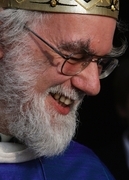 In an interview with Stuart Jeffries in the Guardian, Rowan Williams has a nice little dig at Dawkins – he’s calmly patronising, seemingly by accident.
In an interview with Stuart Jeffries in the Guardian, Rowan Williams has a nice little dig at Dawkins – he’s calmly patronising, seemingly by accident.
“As he escorts me from his study, he tells me he admires Dawkins. “There’s something about his swashbuckling side which is endearing.” He invited atheism’s high priest and his wife to a Lambeth Palace party last year. “They were absolutely delightful.”
Again, classic Williams: the better man being nice about his foe…But the real reason the Dawkins were invited is unexpected. “My son wanted to meet Mrs Dawkins.” Why? “She was in Doctor Who.” Really? “Oh yes. She played an assistant when Tom Baker was the Doctor.” “
More seriously, Williams’ rationale for writing a book about Dostoyevsky is interesting. “I hope it encourages [Christians] to be aware that there are writers and thinkers who’ve plumbed the depths, who’ve looked at humanity in its shadows as well as its triumphs, but who still think it’s worth sticking with the Christian gospel.” It is therefore a very indirect response to atheist attacks – an insistence that ‘Christian believer’ cannot be defined by some stereotype. ‘I thought it might not do any harm to put down a marker about that and say: “Here is a form of Christian engagement with the world and with the complexities of human experience that may be radically wrong but is not cheap or glib and any critique has to deal with this just as much as it has to deal with a southern baptist.”‘
It’s a pretty smart apologetic strategy: don’t forget about those deep and dazzling Christians of the past. It ought to make people like A.C. Grayling pause for thought (not that it will). I like the fact that Williams is coolly refusing to descend to the atheists’ level, and respond to their teenage attacks; instead he is gesturing at the scope of their imaginative ignorance.
———
Television is waking up to one of its central duties. To make us feel okay about society; to spread optimism rather than despondency. I’m talking about Jamie Oliver’s Ministry of Food, of course. It’s a genuinely important bit of culture. It’s more about society than food, and it really does reinvent some of the old British spirit. Let’s not just describe the brokenness of society but do something active and hopeful about it. And, most importantly, instead of sneering at the struggling masses, let’s affirm them – let’s find a surprisingly nice single mother and praise her efforts at reforming her life. The point is that this programme grasps what might be called the religious role of television: to be social propaganda, to help us feel positive about national life. Jamie Oliver is only secondarily a chef. He is primarily a shaman of social hope.







Comments